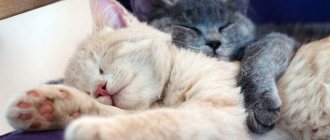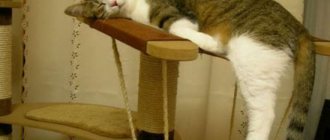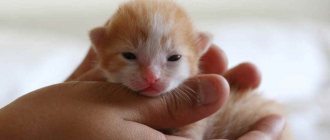The cat is constantly itching
Scratching is a normal cat behavior, but if she starts doing it too often, especially in one particular area, it may be a sign that she is stressed.
Nutritional supplements designed to relax the animal without sedating it, as well as pheromones, can help reduce stress levels.
It is worth paying attention to changes in the environment that may have negatively affected your cat. Every effort must be made to remove them.
Scratching is a form of marking and it leaves a cat scent on the item. The urge to scratch and mark is natural, but if the cat is stressed, this will be exacerbated.
Is your cat acting strange? Here are the reasons
Contents hide
There is a verb in the Russian language “to freak out”. Seemingly serious, mature and respectable people begin to commit actions that are completely out of character for them. As psychologists say, there is a sharp change in habitual behavior patterns. But not only people, but also pets are weird. In particular, cats. These animals have many frankly “strange” character traits in their arsenal. It seems like just yesterday no deviations in behavior were noticed, but today the purr is not itself. What's the matter? Why do cats act weird? We'll figure out.
Behavioral abnormalities may indicate depression. An outwardly healthy animal suddenly withdraws into itself, becomes lethargic, inactive, sleeps more and more or puts itself in order. Perhaps melancholy or real depression has come over your little purr. Why exactly this way and not otherwise? There is a whole complex of reasons, both visible and internal. We have all at least once felt abandoned, forgotten, unloved and unwanted. An ordinary bout of blues develops into real depression. With cats (just don’t be surprised) the same thing happens. How can I help you? Your best helpers are patience, time and care. Spend more time next to your pet, pet him, try to “calm him down.” Say something in an even and calm voice. Offer treats, favorite toys, surround with things that contain your favorite smells. If the issue is purely mental discomfort, these measures will help you.
Stress. Depression and stress are twin brothers. Where there is stress, there is depression, and vice versa. What can cause cat stress? Moving to a new home, the departure of a loved one, the loss of a pet friend, chronic lack of attention from the owners, loneliness - and much more. Advice: always try to maintain the cat’s usual order of things, the usual routine of life. Cats are extremely sensitive to any sudden changes in their lives. I had to move to a new apartment - first of all, determine a room for your pet (the smallest one), put a tray, bowls, favorite toys, old familiar things. And, of course, your attention, care and comfort.
Fears and threats. Sometimes owners do rash things. For example, they decide to bring another pet into the house. Moreover, they neglect the adaptation period - they simply release a newcomer into the house with the words “we ask you to love and favor.” Naturally, the old-timer immediately feels a threat to his comfortable and carefree existence. Behavior patterns change from plus to minus almost at lightning speed - most often this is expressed in “toilet” problems. Among other things, a little tyrant may appear in the house - your child, for example, in the absence of his parents, does not give the pet a moment of peace. Children, unfortunately, can be big hypocrites. Affectionate and obedient next to their parents, cruel and merciless towards animals behind their backs. People are looking for the reasons for their pet’s anxiety and cannot find it - how can they think about their beloved son or daughter. If you encounter something similar, please check our version.
Illness and poor health. Purrs usually hide their sores and ailments from their owners until the last moment. But every day the pain becomes more and more unbearable, and the animal begins to behave strangely. At the same time, you begin to notice something: worsened appetite, constant nausea, constant thirst, etc. Your first logical step is to take your pet to the vet and check the health of your furry friend.
The cat doesn't like you. And this, unfortunately, happens. Most often the situation is this: one day you and your girlfriend (young man) decided to move in together and live together. And the purr simply did not accept the new person. Cats are interesting creatures with their own difficult to explain preferences. Earning a cat's love is not so easy. Stroking and treats may not work - purrs use their famous sixth sense. And in the presence of a person whom they did not accept and did not love, they can behave strangely and unpredictably. What do you recommend? Let's remember the saying - you can't be nice by force. You can, of course, try to coexist somehow, but nothing more. And yes, trust your pet’s intuition. What if you haven’t found “your” person? Please share your opinion on this matter.
Based on : Is Your Cat Acting Weird? 5 Reasons Why. Author : Angela Lutz. Source : catster.com Photo: pixabay.com
The cat does not groom its fur
Grooming is a natural thing cats do. They usually groom themselves and others when they are relaxed or feel that their fur has been damaged in some way. Cats that stop grooming themselves are most likely sick and should be checked by a veterinarian.
Sometimes cats that gain weight are unable to reach certain areas of their body, so they are unable to groom themselves. This can be corrected by helping your cat lose weight.
Joint and muscle pain also affects care. Cats suffering from osteoarthritis or injury may be unable to reach certain grooming areas that they were previously able to reach.
Reasons for strange behavior
Quite often, dog owners notice serious changes in the animal’s behavior after grooming. This is especially noticeable after the first time. The dog may begin to hide from everyone, refuse food and water, and even show aggression. Sometimes he actively itches, whines or walks strangely.
All these rather disturbing symptoms are a reaction to the shortening of the coat. It is not always the master’s fault, but in most cases it is due to the characteristics of the dog itself.
Veterinarians identify three main reasons for changes in dogs’ behavior:
Embarrassment. When he finds himself without his fur coat for the first time, especially if the haircut is ultra-short, the dog feels embarrassed about himself
She realizes that she looks strange, that she has lost a very important part of her appearance, and experiences strange physical sensations. It’s as if a person hasn’t had a haircut since childhood, and then suddenly shaved almost bald.
In this state, the dog will show fear and embarrassment. Attempts to hide, not to contact friends, especially animals, refusal of food and water at first, reluctance to make close contact in the first day are quite normal and expected reactions. Give him time to get comfortable, come to his senses, leave him alone with himself for a few hours. As soon as the animal gets used to the new sensations and understands that nothing terrible has happened, its behavior will return to normal.
Irritation and minor wounds. It is thanks to them that the dog constantly itches and licks the clipped areas, because of them he walks strangely or even cannot go to the toilet normally. This happens if you shave your puppy too short for the first time, almost to zero. This is especially true for areas with delicate skin, such as the genitals, butt or ears. If you notice something similar in your animal, the main thing is not to let it lick or scratch itself, as this will only increase the discomfort. Treat the skin areas with an antiseptic and give an antihistamine and sedative. Repeat taking the products and treating your skin for several days, and everything will get better. Most animals, over time, with sufficiently frequent repetition, overcome this effect; their skin gets used to the effects of metal in the machine and no longer gives such a reaction. But if you trim no more than 2 times a year, then you will either have to experience irritation every time, or cut your hair not so short.
The cat started meowing a lot
Cats can have many reasons for meowing. Crying and meowing are signs of distress, confusion, fear or pain, and if your cat makes these sounds, it means something is wrong.
If your cat begins to scream more at night, it may be due to cognitive dysfunction. If an animal begins to vocalize, hissing or growling, it is most likely due to pain or fear. Assess the situation and think about what changes might have caused this behavior.
If you can't think of any reason for the cries your cat is making, consider scheduling a visit to your veterinarian to see if there is a medical reason for your cat's concern.
Why do cats become suddenly active?
Just five minutes ago everything was calm, and suddenly there was a hurricane. Your furry pet, with the excitement of a hunter pursuing prey, rushes to your feet, arches his back, his eyes sparkle. Or vice versa - it watches every movement and attacks you from ambush. The cute cat, who was dozing in a chair five minutes ago, has turned into a small predator.
You can try to calm a raging domestic tiger by pouring water, squawking, or clapping your hands. But with such a reaction you will most likely only spur the animal to further action. It is better to try to channel your pet's unbridled energy into a more peaceful direction.
The need for play and movement is natural. She can be satisfied by playing with her friends or toys - a ball, a paper “butterfly”, a toy mouse. If you cannot get another member of the cat family, then play with your cat yourself several times a day. And only when you feel the approaching start of “hostilities”, and on your own initiative.
And so that you don’t have to wake up from a cat attack at night, play with the “tiger cub” before going to bed. You can protect your sleep by simply closing the door, but then you may have to listen to dissatisfied meows and the noise of falling objects.
Is your pet getting ready to pounce again? There is no need to express concern. Be glad that he is healthy and energetic.
Description of possible causes
If a cat behaves restlessly for a long time, then first it needs to be carefully examined for possible injuries. If no visible damage is found, then the possibility of parasites should be excluded.
It is not possible to do any more diagnostic measures at home. Especially in cases of viral infections and congenital pathologies (mainly hearts in decorative breeds). In any case, you need to keep in mind the following possible causes:
Worms
A common phenomenon even in pets that do not go outside at all.
Unfortunately, some owners are sure that if their animal does not go outside, then there is no place for it to pick up parasites. However, this is a big misconception, since worms can get to a pet through food (raw fish, meat), from the soles of shoes (the same owner can bring parasite eggs from the street), after bites of mosquitoes, sand flies, fleas, or from other animals (that visit street).
Symptoms are always different, but in most cases, owners notice that the cat is behaving strangely, its gait may change, or it will try to bite itself. If there is severe itching (and it happens often), the pet may scratch its butt on the floor or constantly lick the anus area until it becomes bald.
In severe cases, bloody diarrhea and vomiting may occur. Then it’s better not to risk it and take a stool test to identify the type of helminths. As for treatment, today there are enough drugs against worms with a wide spectrum of action (Drontal, Milbemax, Stronghold, Kanikvantel, Prazicide).
For kittens up to 6 months of age, monthly treatment is recommended. Further treatments are carried out once every 3-6 months.
Fleas
Very often they cause restless behavior in cats, since the bites of these insects can be accompanied by an allergic reaction to their saliva.
Even if the pet does not go outside at all, parasites can get onto its fur from the soles of the owner’s (or his guests’) shoes, grass (the favorite treat of all cats), things (carrier, comb, etc.).
The first signs of the presence of these insects in an animal is the appearance of black specks in the fur (can be the parasites themselves or their metabolic products). Symptoms may also affect the color of the coat (it will become dull) and the skin (there will be redness in places).
If there is no large fireplace in the house, then it is very easy to remove fleas with the help of special preparations that are applied to the withers. They are effective against sexually mature individuals and their eggs. Stronghold and Frontline are considered the best today. Many veterinarians also recommend mandatory disinfection of the apartment using special means. This will help avoid relapses in the future.
Allergy
It can cause a lot of discomfort to the animal, as in most cases it is accompanied by unbearable itching. Along with this, redness and peeling may appear on the skin.
The affected area often swells. This reaction can be provoked by poor nutrition (most often), insect bites (flea dermatitis), contact with chemicals (household chemicals, poisons, etc.).
In case of a severe allergic reaction, you must immediately give your pet an antihistamine (diphenhydramine, Zyrtec, Claritin). Immediate hospitalization is required in cases where there is a risk of suffocation (bites of stinging insects on the tongue, in the neck area) or the development of anaphylactic shock (reaction to medications).
A bite of an insect
During the season when stinging insects are active, when the windows into the house are almost always open, there is a risk of your pet “meeting” a wasp, bee or bumblebee. A bite from any of them can cause not only restless behavior in a cat, but also provoke a severe allergic reaction (if the bite is in the area of the mouth, eyes or oral mucosa).
The owner needs to carefully examine the suspected bite site for the presence of a sting (if it is present, it must be removed without fail). In most cases, swelling subsides within a few hours, redness disappears within 1-2 days.
Separately, I would like to say about kittens whose strange behavior may be associated with infectious diseases (rhinotracheitis, herpes, calicivirus). But, along with this, other symptoms are almost always present (discharge from the nose, eyes, paroxysmal cough). Only timely vaccination will help you avoid an “encounter” with these life-threatening viruses.
Watch this video on YouTube
How to treat depression in a cat?
First of all - attention. Offer your pet a game, pet it gently, and talk in a calm voice. The animal must feel safe and psychologically comfortable. Treat your cat to his favorite treat, arrange a comfortable place for sleep and privacy. In general, provide excellent care for your cat throughout. Eliminate all stressors as much as possible. Also, to normalize the condition, the doctor may prescribe general strengthening drugs and medications to correct the animal’s mental state. Medicines are selected on an individual basis.
Also, often in cases where the owner does not have the opportunity to provide the animal with proper care, but communication and attention, or if a sociable cat is too hyperactive for the owner, it is often recommended to get another animal so that the cat does not feel lonely when you are busy or absent. You shouldn’t be afraid that the animal will completely switch from you to its new playmate, but you should remember that everyone’s characters are individual and a lot depends on you, too. If the animal is very jealous, you still shouldn’t resort to such a solution - it can aggravate the situation. We should also not forget about the possibility that animals may not get along with their personalities, including among themselves.
The doctors at the Amis clinic are ready to provide your cat with qualified care. Come and we will select an effective course of treatment for your pet.
A cat buries its excrement so as not to offend anyone
Many people who have cats in their apartment know that after the pet has gone to the toilet, it intensively buries everything. It looks like the cat is performing these actions instinctively, but there is a reason for these actions.
This behavior was inherited by cats from their ancestors. Even before cats were domesticated, they had many dangerous enemies. And so that their enemies would not find them, the cats buried all their tracks.
Also, cats buried everything they did so as not to offend the dominant male of their group. Therefore, by burying their excrement, cats show their owner that they are afraid of him. As soon as the four-legged pet stops doing this, it will mean that he is no longer afraid of you.
Funny things to do
These quirks of Murzilkas serve as the basis for all sorts of tales, and once again prove that cats are quite capable of observing, remembering and drawing conclusions. But even funny quirks are not always pleasant to the owners, although punishing pets for this is practically useless - after all, the pet understands perfectly well that he has achieved his, albeit unseemly, goal. In addition, some unusual actions and habits of fluffies are also signals to the owners that not everything is all right with the pet.
Vindictiveness
Cat vindictiveness causes owners a lot of minor and major inconveniences, but it is almost impossible to defeat it. So, for example, if a cat has an unloved (and, as a rule, unloving) family member, then he will get more from the animal, the more the purr is punished. One cat I knew, who lived in a family with two brothers and a sister for 19 years, disliked his sister from the very beginning, and regularly shit on her pillow throughout his long life if he thought she had done something wrong. No amount of punishment corrected this behavior, but, nevertheless, it was not difficult at first to defeat the cat’s vindictiveness - just win his trust by feeding and affection. Such revenge seemed funny to those around him, but unpleasant, and the cat was saved only by the ardent love of all the other family members.
But if an obstinate cat does not limit himself to odorous gifts or sudden jumps from around the corner, but regularly tries to scratch until he bleeds or bite painfully, the owners will have to resort to punishment - loud claps or dousing with cold water. A thick peel of lemon or orange also helps, with which you can spray the hateful citrus smell “in the face” of the ugly person. In learning from excessive aggression, as in developing any other cat habit, regularity is important. Under no circumstances should you spank, especially with your hand, as this can provoke a real, full-fledged attack from a predator, albeit a small one.
Cooperation
Cooperation among purrs also sometimes takes funny forms. Especially the kind of cooperation from which self-centered cats do not derive any benefit. For example, in a familiar family, a cat and a spaniel bitch lived for a long time, and there was no special friendship between them - the dog more than once chased the cat to punish it or have fun. But as soon as the owners had forgotten candy or cookies on the tall refrigerator, the cat, having climbed in there, calmly pushed the treat onto the floor, where the second mischief-maker was already waiting for him. And in a house where a cat lived next to a budgie, the owners often found the cage open and the bird roaming free. Neither changing cages nor increasing constipation helped the owners, who feared for the bird - anyway, sooner or later the parrot ended up free. But one day everything was revealed - it was the cat who opened the door, and the hunt for feathered game did not attract him at all, but was apparently interested in the process of opening itself.
All such stories indicate that the cat is bored - little attention is paid to him or he is often left alone. And if owners don’t like such funny moments in the life of furry mischief-makers, they should worry about buying toys and cat houses - as a rule, all this distracts petty hooligans, switching their attention to other fun.
Unusual diet
The unusual eating habits of purrs also serve as fodder for funny stories. One gentle-red half-Persian I knew loved fresh cucumbers more than any other food. And how many stories exist about how olives, white bread, canned corn and even apricots can drive tailed gourmets crazy, surprising their owners with this. But this behavior should hint to all cat owners that their pet’s diet may lack a complete plant component. After all, a cat in nature eats its prey whole, and the stomachs of mice and birds are usually full of grain, which then ends up in the cat’s stomach. A small amount of mixed grain porridge added to the usual food will help compensate for the lack of plant fibers, which improve intestinal function in cats.
A passion for olives may indicate a basic lack of fat, and a few drops of olive oil per serving of food will help cope with this problem. Well, if porridge and butter did not improve the situation, it is quite possible that this is not an alarm signal, but simply a love for certain products, which may amuse, but should not surprise. Indeed, in nature, among the cat population, there is a small percentage of animals whose diet consists of more than half plant foods.
Cat songs
No, the serenades of spring cats or the passionate calls of cats in a state of estrus (heat) do not surprise owners. But some “conversations” surprise and touch purrs’ owners, since cats rarely try to let their owner know with sounds about something more complex than an empty bowl or a full toilet. The same red half-Persian adored his owner and always met her at the door, cooing for a long time and excitedly, something between a meow and a purr. One got the full impression that he was telling how he spent the day and was interested in the news. And another obstinate cat, who loved to eat, screamed indignantly if his owners, who did not want to overfeed him, refused to immediately give him food. Moreover, he did not meow at all, wandering around the bowl and begging, but went out into the corridor and made very loud, clearly angry sounds, halfway between a purr and a growl - he swore.
This behavior, characteristic almost exclusively of “apartment” cats, is not typical for walking or street cats - it is unsafe for them. But pets who constantly live side by side with people are well aware that communication through sound is important for people, so they “express” their feline emotions. Unfortunately, cats do not choose a convenient time for “talking,” which greatly upsets some cat owners. Alas, it is almost impossible to stop furries from “talking”, and you will have to lock the bedroom from them in order to get a good night’s sleep.
Hunting instincts
Affectionate purrs are, first of all, predators, and when accepting a tiny ball of fluff into the family, you need to understand this. Although a cat can sleep up to 20 hours a day, the rest of the time she will definitely want to hunt, and here all pets behave differently. For some of them, a ball, a string or a fur mouse is enough, but for others, a “non-living” goal is not attractive. But since there is usually no worthy prey in the house for the predatory purr, it often becomes the owner. One striped huntress I know has taken a liking to the hat rack in the hallway, and periodically scares the owners and guests into hiccups by smacking them on top with her soft paw. There is no need for her to let out her claws - the hooligan is quite happy with the commotion she creates. And although a frightened “victim” does look quite funny, this behavior does not make everyone laugh. This ugly creature of rather respectable age could not be weaned from the habit, which is amusing to everyone except the object of the hunt, but other lovers of suddenly biting their legs or, jumping, covering them with their paws, can be re-educated by offering all kinds of toys.
Punishing a pet in such cases is practically useless, since the cat, in the excitement of the hunt, often accepts punishment as an element of the same game, but continuing the game by “slipping” it with a cat toy is very useful - this way you can switch the usual hunting attention to another object. But in no case should you continue the game, attracting the cat’s attention with your hand or foot - then the murzilka will definitely be convinced that the person is his “legitimate prey”, and may in the future scare the child or anger a guest who does not like cats.
The cat demands to open the door to the room, but does not go there herself.
It happens that a cat stubbornly meows in front of a closed door to a room, scratches the door with its claws, demanding to be let in immediately. But as soon as the door is opened, she loses interest in this room, turns away and leaves, or freezes on the threshold and does not want to enter.
People involved in the supernatural claim that cats communicate and sometimes become friends with brownies. This is how the cat looks for its friend in the rooms. Therefore, she demands to be allowed into a closed room. But as soon as she sees that there is no brownie in this room, she leaves to look for him further.
From a scientific point of view, the animal’s behavior is explained by the desire to control its territory. All cats consider themselves the owners of the apartment where they live. As the owner, they want to have unhindered access to all premises. The cat must keep everything under control, then it will be calm. Having made sure through the open door that everything is in order in the room, she does not go there as unnecessary.
There are different explanations for the eccentricities of cats. Some people believe in the psychic abilities of pets, while others explain their behavior in terms of reason. But everyone agrees on one thing - the cat is one of the most unusual pets with its own well-established set of habits.
How to bring positivity and well-being back into your home?
You can try to cleanse the energy at home with holy water, prayer and church candles. Starting at the front door and moving clockwise, walk around your home, reading the Lord's Prayer aloud. Run your hand with a burning candle over each corner. Pay special attention to your sleeping area. He should be crossed three times and sprinkled with holy water. Wait until the candle burns out and take the stub out of the house along with the trash as quickly as possible. Wash your hands thoroughly with soap and salt after performing the ritual of energy cleansing of space. It helps to periodically fumigate your home with herbs such as immortelle and thistle to combat evil spirits. Add salt to the water when cleaning floors. This mineral is a good conductor; it is able to absorb and take away bad energy. Try to sort out and throw away all the trash stored in the house. What is broken, give it to be repaired. Throw away items that cannot be repaired without regret. It is better to give away what you have never needed during the last year to friends or those in need. If your efforts do not bring results, and the heavy energy of the home continues to depress you, you can turn to the help of specialists. Ask the priest to bless the house.
And the most extreme case, when nothing helps, is moving to another house. Don't be afraid of change. They are usually the very challenge that gives us new opportunities for growth. Most importantly, remember, positive energy always defeats negativity. Fill your life with good thoughts and good deeds, laugh more often and watch pleasant films.
Let your home be full of love and light!
Found a violation? Report content
Rewarding undesirable behavior
You stretched out exhausted on the sofa in front of the TV. Then meowing is heard from the kitchen. Then again. You try to ignore him, but your cat won't allow it. Another louder and more demanding call is heard. This is where you give up. “Do you want a snack, my boy?” - you ask, getting off the couch and heading to the kitchen. - “Okay, come here!” After that, you fall back onto the couch, hoping to lie in peace and quiet for a while. What happened?
In short, you have been well trained. But since your training isn't the main point of discussion in this case, let's focus elsewhere and say that your cat just received a reward for meowing. What will be the most likely outcome of this? He will meow even more in the future. And to make matters worse, you've just taught him to meow repeatedly. But persistence is not at all a quality that you would like to develop in your cat, since it is firmly rooted in animals of this species.
So there are two rules for dealing with cats, although we are told that the same rules can be applied to parenting and marital relationships as well: 1) Successful extortion is always repeated. 2) If you are going to give in, do it right away.
The cat sleeps, and then suddenly jumps up and hides
Mystics are sure that cats can interact with otherworldly forces, are guides to the world of the dead, see and feel spirits, and communicate with brownies. The cat's quirk associated with suddenly waking up and running away is explained by the activation of the dark forces living in the apartment. An evil spirit frightened the cat, and he had to escape.
The scientific explanation is that cats, unlike humans, have much more developed senses. In her sleep, she heard a sound from the street that seemed dangerous to her. Following her instincts, the sleepy cat chose not to figure out what happened, but to run away.
Don't poke your cat's nose into the dirt - it's stressful for her.
Many of you have probably been told to rub your cat's nose in its dirt or spank it. Physically punishing your cat will only make things worse! Of course, in doing so you will teach your cat something, but one thing: to be afraid of you. And you absolutely do not teach her how to use the toilet. Since many toilet problems are the result of stress in an animal, physical attacks will only increase this stress, and increased stress will lead to an increase in the number of mistakes he makes.
Most people resort to physical punishment when they are completely frustrated, when they do not know how to express their needs and desires. But you cannot confuse disappointment with training or education: they are incompatible. This is a loss of control, and your cat will easily recognize it. For cats, nothing is more important than self-defense. They will seek safety, and if safety is somewhere far away from you, your cat will either run away or chase you away in order to find that safety.










